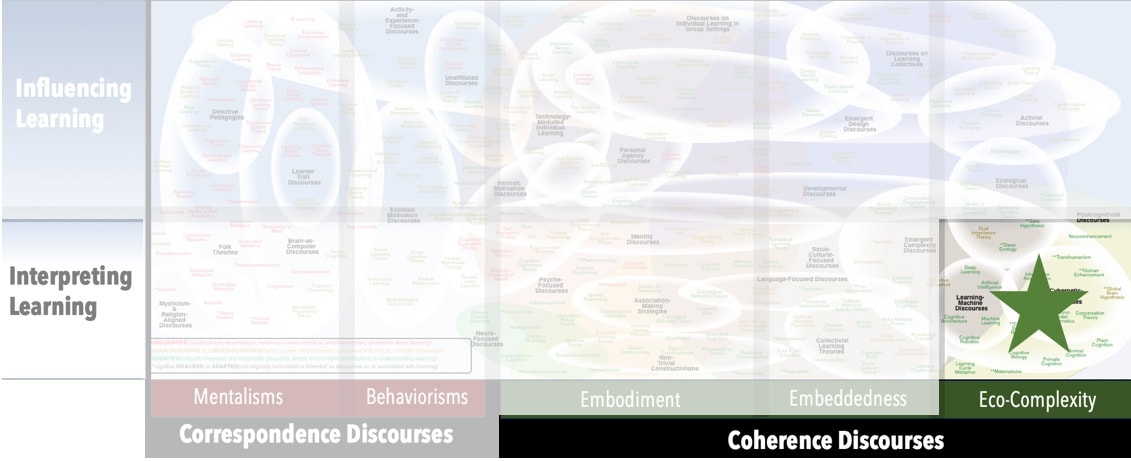Focus
Surpassing current human limitationsPrincipal Metaphors
- Knowledge is … repertoire of possibilities (for thinking and acting)
- Knowing is … appropriate functioning
- Learner is … a technologically enhanced individual
- Learning is … expanding one’s repertoire of possibilities
- Teaching is … N/A
Originated
1990sSynopsis
The term Human Enhancement is used to collect any attempt to overcome current limitations or amplify current possibilities. While such efforts can be through natural or artificial means, the overwhelming emphasis is on technology-mediated enhancements (e.g., medications, supplements, implants, bio-engineering, wearables, offloads/uploads) to treat illness, mitigate disability, extend life, manipulate genetics, augment memory, improve perception, accelerate thought, and increase strength. Associated discourses that are mainly focused on mechanics include:- Biomechatronics – a field focused on integrating mechatronics (i.e., electronic and mechanically engineered devices) with biological forms
- Bionics – a branch of engineering concerned with mechanical systems that function like or that can substitute for aspects of living systems
- Biotechnology – a term that refers broadly to research into and production of biologically based projects that address some human need
- Cyberware – a field focused on the development of implantable machines that interface with the brain or other parts of the nervous system
- Cyberwear – likely a play on Cyberware (see above), any wearable technology that might enhance connectivity, perception, or other capabilities
- Human–Machine System (Man–Machine System; Person–Machine System) – any system in which there are functional interdependencies between human(s) and mechanical technology(ies). Associated constructs include:
- Human–System Coupling – the level of interdependence of operator and system
- Neuroprosthetics (Neural Prosthetics) – field focused on the development of devices designed replace missing neurological functionality
- Microdosing (Psychedelic Microdosing) – regularly consuming subperceptual amounts of Psychoactive Drugs (typically 5–10% of a recreational dose of, e.g., psilocybin mushrooms, LSD, MDMA, or THC) to improve mood, energy, focus, creativity, eating habits, and/or sleeping patterns. There is evidence Microdosing is effective for treating mental illness, including PTSD, addiction, and depression.
- Psychoactive Drug (Psychoactive Agent; Psychopharmaceutical; Psychotropic Drug) – a substance that affects the functions of the central nervous system, typically used to alter mood, perception, and/or thought and behavior patterns. Categories include:
- Nootropics (Cognitive Enhancers; Smart Drugs) – From the ancient Greek for “mind turning,” Nootropics are substances that are asserted – frequently without sufficient evidence – to improve learning, thinking, memory, awareness, motivation, intelligence, and/or creativity.
- Psychopharmacology (David Macht, 1920s) – the study of the cognitive effects (including, e.g., on mood, thought, perception, awareness, judgement, and recall) of drugs (including any artificial or natural exogenous substances and any natural endogenous substance). Associated constructs and discourses include:
- Behaviorceutical (Kelly Lambert, 2010s) – a portmanteau of “behavior” and “pharmaceutical” used to suggest that actions and experiences can alter brain chemistry in manners similar to pharmaceuticals
- Neuropsychopharmacology – a branch of Psychopharmacology with a strong focus on the neural mechanisms associated with the effects of chemical substances
Commentary
The major criticisms of Human Enhancement, especially those that are enabled by emerging technologies, have to do with the common observation that answers to “Can we do it?” seem to be outpacing discussions of “Should we do it?” Some commentators have voiced particular concerns around the enhancement of cognition, with worries on the personal level that self-identities will be fundamentally redefined and on the collective level that new social classes based on mental capacities might arise (or disparities based on wealth might be amplified). Other commentators have shrugged off such anxieties, arguing that merging with technology will become necessary and inexpensive.Authors and/or Prominent Influences
Diffuse, with discussions dominated by futurists (e.g., Ray Kurzweil)Status as a Theory of Learning
The past century of theorizing about and inquiring into personal learning has prompted realizations that it is always and already distributed, situated, and technologically mediated. But it seems that such insights are only now starting to press into the realms of the popular and the commonsensical, propelled in large part by discussions related to Human Enhancement. That is, Human Enhancement and its associated discourses appear to be contributing to significant and pervasive reconsiderations of what theories of learning are all about and what technology is. Thus, it a very pragmatic sense, Human Enhancement is a theory of learning.Status as a Theory of Teaching
Human Enhancement is not a theory of teaching, at least not in terms of any common interpretation of “teaching.”Status as a Scientific Theory
Human Enhancement has an extensive, varied, and ever-accelerating research base.Subdiscourses:
- Behaviorceutical
- Biomechatronics
- Bionics
- Biotechnology
- Cyberware
- Cyberwear
- Human–Machine System (Man–Machine System; Person–Machine System)
- Human–System Coupling
- Microdosing (Psychedelic Microdosing)
- Neuroprosthetics (Neural Prosthetics)
- Neuropsychopharmacology
- Nootropics (Cognitive Enhancers; Smart Drugs)
- Psychoactive Drug (Psychoactive Agent; Psychopharmaceutical; Psychotropic Drug)
- Psychopharmacology
Map Location

Please cite this article as:
Davis, B., & Francis, K. (2024). “Human Enhancement” in Discourses on Learning in Education. https://learningdiscourses.com.
⇦ Back to Map
⇦ Back to List
